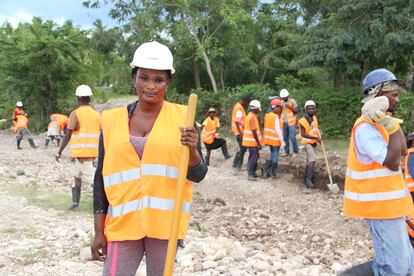Addressing inclusion in public budgets for greater gender equality
In the face of multiple global crises that disproportionately affect women, integrating the commitment to inclusion and equity into public budget planning in Latin America and the Caribbean is key for regional development

History was made on March 8, 2020, when the women of Latin America and the Caribbean made International Women’s Day their own, organizing one of the largest mobilizations of people in the region in recent times. From Mexico to the Argentine Patagonia, millions of women came together in protest to demand equal opportunities. Ironically, the clamor of this protest was overshadowed by the Covid-19 pandemic emergency that was declared that same month.
Today, four years later, it is clear that the profound impact of the pandemic and the confinement imposed to mitigate it has, in some cases, led to the worsening of inequalities, and to the reversal of many of the gains made in terms of gender equality in the region. “In the first place, women in Latin America and the Caribbean continue to face more job restrictions at the workplace than men, with 34 percent of women employed in vulnerable jobs that are often less productive and offer lower wages,” explains Paola Buitrago, Economist at the World Bank. “In addition, there is clear inequality in the distribution of unpaid household responsibilities, on which women spend more than twice as much time as men,” she adds.
One of the clearest post-pandemic lessons for public policy formulation is the imperative need to address gender inequalities comprehensively in the region. Moreover, it is now recognized that economic and financial crises, armed conflicts and the increased intensity of natural phenomena due to global warming are not gender-neutral issues. Women bear the brunt of multiple global crises.

Against this background, Urska Zrinski, Senior Public Sector Specialist at the World Bank and an expert in gender-responsive budgeting, stresses that “right now, the stakes are high and the commitment to gender equality needs to be reflected in national budgets.” Zrinski points out that “although inequality between men and women persists, the truth is that, as a region, Latin America and the Caribbean has made significant progress in women’s empowerment in recent years. This is corroborated by the World Economic Forum’s 2023 Global Gender Gap Report, which places the region as third highest on the gender equality index, after Europe and North America.”
A gender-responsive budget is one that recognizes the differential impacts of public entities’ expenditure and revenue policies on women and men, and leverages this approach to help create more inclusive societies. As indicated in a report prepared by the World Bank, several countries in Latin America and the Caribbean have made significant progress in integrating gender considerations into public budget planning.
Mexico, for example, has one of the most developed gender-responsive budgeting approaches globally. Countries with active policy initiatives in this area, such as Argentina, Guatemala and others, recognize the impact of closing gender gaps and promoting women’s financial empowerment and have already started integrating gender considerations in their budgets. Despite this progress, there are still challenges to be overcome in the areas of implementation, political will and monitoring mechanisms.
Zrinski also highlights other notable practices in the region. “Countries such as Guatemala, Argentina and Colombia make provision for labeled expenditure, which is a tool in the expenditure budget that guarantees the allocation of specific resources to meet women’s needs. This helps assess the amount of public spending needed to achieve gender equality goals and promotes transparency and accountability,” she notes. “Another good practice can be found in Ecuador, Guatemala, Honduras and Uruguay, where institutions are subject to gender audits, the results of which can help enhance policy evaluation and the identification of areas of opportunity.”
On another note, the gender-responsive budgeting approach is particularly important for Caribbean countries, as they are more vulnerable to the impacts of climate change. “It is imperative to budget for equity and equality in natural disaster risk management, as natural disasters have been shown to disproportionately impact women, children, persons with disabilities, ethnic and racial minorities, Indigenous peoples, and other marginalized communities,” adds Zrinski.
In this regard, the World Bank is also providing support to Caribbean states for the development of gender-responsive budgeting with a broad-based approach, including the aspect of gender-responsive public procurement.
In relation to this issue, Manjola Malo, a senior procurement specialist, explains: “According to recent data, women own 34% of small and medium enterprises globally, but their share of the public procurement market varies between 1% and 5%. It should be noted here that the purchasing power of governments has an enormous influence on markets and has the potential to lay the foundation for economic and financial inclusion in the Caribbean. This is why we are analyzing the available data and current legislation to explore the different entry points in public procurement processes in the Caribbean that could allow more women access to public tenders.”
Lastly, it should be noted that, in addition to promoting inclusion, gender budgeting brings other benefits, such as accountability in different aspects of public spending, as it allows access to the requisite information on budget performance. “This is the case for both Grenada and Saint Vincent and the Grenadines, two countries that implement a financing framework for gender equality that allows for better monitoring of results and for the identification of gaps in areas such as health and labor market participation,” concludes Zrinski.
By considering social inclusion in the budget process, governments can ensure that the needs of the other 50 percent of the population are taken into account. In the face of a complex reality of multiple crises, gender budgeting is a tool that has the potential to generate multiple solutions to the challenge of inequality in Latin America and the Caribbean.
Sign up for our weekly newsletter to get more English-language news coverage from EL PAÍS USA Edition
